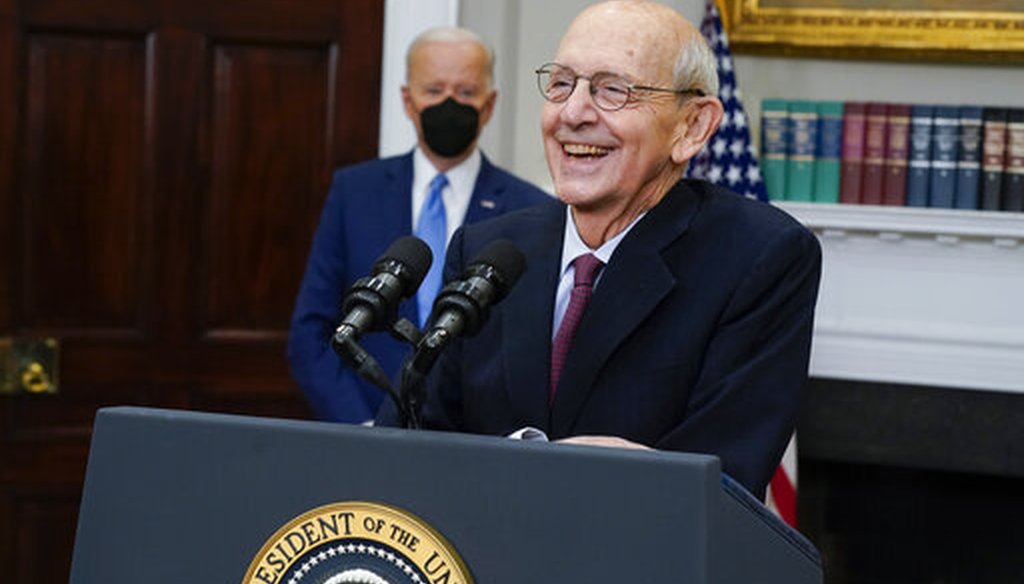



Supreme Court Justice Stephen Breyer announces his retirement at the White House on Jan. 27, 2022, as President Joe Biden looks on. (AP)
• Thomas is the only current member of the Supreme Court to be nominated by a president of one party and confirmed by a Senate of the other.
• All told, 12 of the 15 successful nominees since 1980 have been nominated by a president of one party and confirmed by a Senate of the same party.
• However, Todd’s phrasing suggests that Thomas’ status as the only justice confirmed by the opposite party would be new, when it’s actually the case now.
When Supreme Court Justice Stephen Breyer announced in January that he would be retiring, it gave President Joe Biden his first opportunity to appoint a justice to the nation’s highest court. Once Biden makes his nomination, he’ll have a Senate majority, but a thin one — enough Democrats to meet the simple majority threshold required for confirmation as long as the party remains unified.
During a discussion of who might succeed Breyer on NBC’s "Meet the Press," host Chuck Todd offered a statistic showing how unusual it has been in recent years to have a Senate of one party confirm a nominee from a president of the other party.
"Clarence Thomas is about to become the only member of the current Supreme Court who was nominated by a president of one party and confirmed by a Senate controlled by the other party," Todd said on Jan. 30.
A review of the confirmation history of the current justices confirms that this is correct.
After a divisive confirmation process that included allegations of sexual harassment against the nominee, Thomas was confirmed by a relatively narrow margin of 52-48. Thomas was appointed by President George H.W. Bush, a Republican, but confirmed by a Democratic-majority Senate. (Biden, then a senator, voted against confirming Thomas.)
Every other current justice was either appointed by a Republican president and confirmed by a Republican Senate (John Roberts, Samuel Alito, Neil Gorsuch, Brett Kavanaugh, and Amy Coney Barrett) or appointed by a Democratic president and confirmed by a Democratic Senate (Sonia Sotomayor and Elena Kagan).
The only caveat we could find for Todd’s statement is that Thomas isn’t "about to become" the only current justice to have been confirmed by a Senate of the opposite party, since he already is the only one. Breyer, who was appointed by Democratic President Bill Clinton, was confirmed at a time when Democrats controlled the Senate, so his impending departure won’t change the math.
Of the six former justices who have been confirmed since 1980, four were appointed and confirmed by the same party and two were not. The outliers, Anthony Kennedy and David Souter, were both appointed by Republican presidents and confirmed by Democratic-controlled Senates.
Experts say this pattern stems from growing partisan polarization both in the country at large and within the Senate itself.
"There’s been a specific cycle of escalating reprisals that’s been going on with judicial appointments," said Kermit Roosevelt, a University of Pennsylvania law professor.
For instance, when Antonin Scalia died during his tenure on the court, Barack Obama, a Democrat, was president but Republicans controlled the Senate. Obama nominated Merrick Garland to fill the seat, but Senate Republicans blocked his nomination for the better part of a year, until Donald Trump won the presidency. Senate Republicans proceeded to fill Scalia’s seat with Neil Gorsuch, a Trump nominee.
Then, when Ruth Bader Ginsburg died while serving on the bench, Senate Republicans rushed to confirm Barrett just weeks before the 2020 election that would ultimately be won by Biden, a Democrat. (This maneuver earned a Full Flop for then-Senate Majority Leader Mitch McConnell, R-Ky.)
"This is one of the reasons I favor term limits for justices, as part of a package that would make clear that each president is entitled to two appointments per four-year term," Roosevelt said. "I think the appointment process has been degraded to the extent that no president in the foreseeable future will get a nomination through a Senate controlled by the opposite party."
John J. Pitney Jr., a Claremont McKenna College political scientist, expressed slightly more optimism about a cross-party confirmation, but only slightly.
"An opposing-party Senate might approve a nominee in the next several years, provided that the nominee is a moderate who would not shift the ideological makeup of the court," Pitney said. "But the key word is ‘might.’ It would be no sure thing, and it is very hard to see an opposing-party Senate approving a nominee who would tilt the balance against its preferred side."
Todd said, "Clarence Thomas is about to become the only member of the current Supreme Court who was nominated by a president of one party and confirmed by a Senate controlled by the other party."
Thomas is the only current member of the Supreme Court to be nominated by a president of one party and confirmed by a Senate of the other. All told, 12 of the 15 successful nominees since 1980 have been nominated by a president of one party and confirmed by a Senate of the same party. However, Todd’s phrasing suggests that Thomas’ status as the only justice confirmed by the opposite party would be new, when it’s actually the case now.
We rate the statement Mostly True.
Chuck Todd, comments on NBC’s "Meet the Press," Jan. 30, 2022
Supreme Court, current members, accessed Jan. 31, 2022
U.S. Senate, "Supreme Court Nominations (1789-Present)," accessed Jan. 31, 2022
Email interview with Kermit Roosevelt, University of Pennsylvania law professor, Jan. 31, 2022
Email interview with John J. Pitney Jr., Claremont McKenna College political scientist, Jan. 31, 2022
In a world of wild talk and fake news, help us stand up for the facts.
